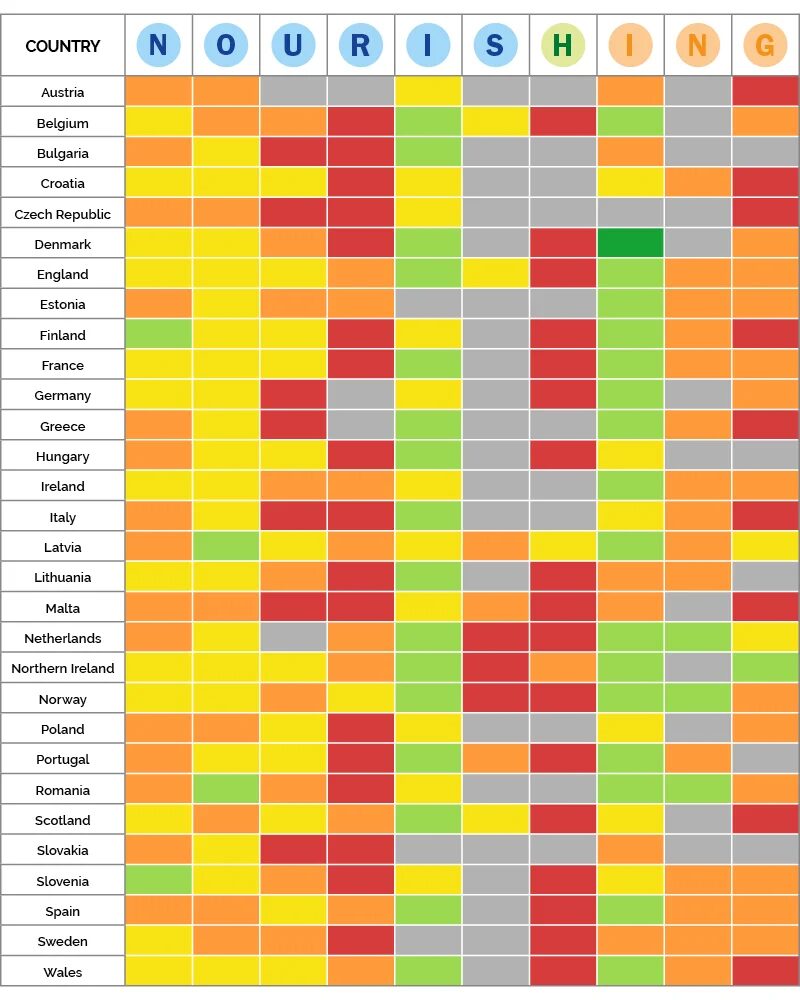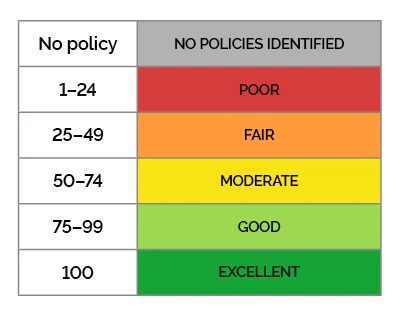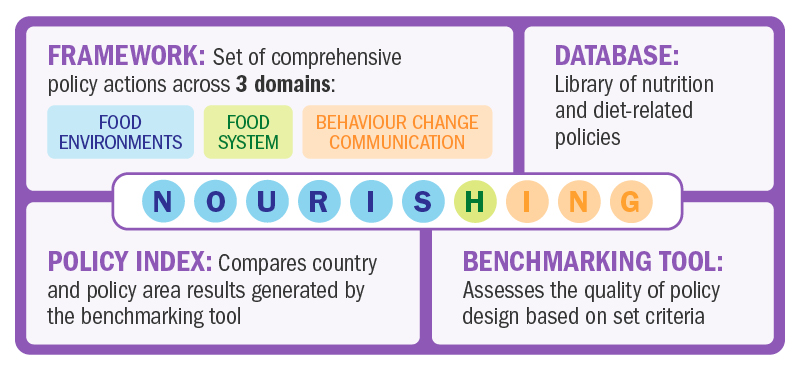NOURISHING nutrition policy index
The NOURISHING policy index evaluates the design of diet-related policies from 30 European countries.
The index is an at-a-glance assessment of how well countries in Europe are doing in enabling people to eat healthy diets. It rates and compares countries using the NOURISHING benchmarking tool based on the quality of their policy design in the different policy areas of the NOURISHING policy framework.
These areas are:
- nutrition labelling (N),
- standards for healthy foods in public bodies and other settings (O)
- using economic tools to address food affordability and purchase incentives (U),
- restricting food advertising and other forms of commercial promotion (R),
- setting nutrient limits or targets for the improvement of the food products (I),
- setting incentives and rules to create a healthy retail and food service environment (S),
- ensuring coherence between food supply chains and health (H),
- public awareness about food and nutrition (I),
- nutrition advice and counselling in healthcare settings (N),
- and giving nutrition education and skills (G).
The index is a tool for highlighting policy strengths and weaknesses and support advocacy for better measures to enhance efforts to improve healthy diets. The index results were published as part of a policy brief in 2023 as part of the CO-CREATE project.
> Download the NOURISHING policy brief from our resource library
Policy index matrix
Nutrition policies from 30 countries were assessed against our NOURISHING policy benchmarking tool. Results from each country are displayed for each area of the NOURISHING framework and are placed in 5 categories from poor to excellent. The results from each country are displayed in a matrix to allow cross-country comparison.

Policy index categorisation table

> Find out more about how the index was produced
What does the NOURISHING policy index tell us?
Our research showed that there are considerable gaps in policy action across Europe. Four policy areas achieved mostly moderate or good policy design in all 30 countries:
- nutrition labelling (mostly moderate)
- standards for healthy foods in schools and other public settings (mostly moderate)
- setting nutrient limits or targets for the improvement and reformulation of food products (mostly good)
- policies to inform people on healthy eating (mostly good)
Policy areas consistently rated as poor or fair were:
- restrictions on advertising and marketing of unhealthy foods to young people
- nutrition education and skills eg in schools
- nutrition counselling in healthcare settings
There was insufficient national government action in all of the European countries we looked at on:
- using economic tools to address food affordability and purchase incentives
- ensuring coherence between food supply chains and health
- setting incentives and rules to create a healthy retail and food service environment
Translations
Our NOURISHING policy brief is now available in French, German and Spanish, as well as English.
> Find translations in our resource library
Watch a webinar about the NOURISHING policy index:
Policy tools used to produce the index
The index is structured around our NOURISHING framework and was developed by applying the NOURISHING benchmarking tool on policies from 30 European countries in the NOURISHING database.

Physical activity policies
We have also produced an index focusing on physical activity policy: read our MOVING policy brief.
NOURISHING policy index FAQs
-
What does the index show?
The NOURISHING policy index rates the “policy status” of nutrition policy in different countries. It combines a large amount of information in a single assessment of each policy area of the NOURISHING framework. Results are displayed by country and policy area, allowing comparisons between countries.
The index:
- Gives a value for the strength of policy design in the 10 areas of the NOURISHING framework for each country.
- Looks at the interplay between the policies under each area, rather than individual policies.
- Offers an at-a-glance assessment of how well national governments are enabling healthy diets.
- Identifies gaps and opportunities for action in each country and across Europe.
-
How was the index produced?
The index was produced by benchmarking nutrition policy actions against aspirational standards in 30 European countries. The tools were applied on complete datasets of nutrition policy actions taken by a national government. Datasets were collected through a comprehensive scan methodology for 30 European countries and are available in our NOURISHING database.
-
How were the index scores calculated?
The index scores were calculated in two stages:
- Benchmark scores (0–100) = Policy action presence (“no” = 0, “yes” = 50) + Average of design attributes scores (0–50)
- Policy area scores (0–100) = Calculated average (mean) of benchmark scores for each policy area
-
Which countries did you include?
We benchmarked 30 European countries which have data available from the Health Behaviour in School-aged Children (HBSC) Study. The countries are: Austria, Belgium, Bulgaria, Croatia, Czech Republic, Denmark, Estonia, Finland, France, Germany, Greece, Hungary, Ireland, Italy, Latvia, Lithuania, Malta, Netherlands, Norway, Poland, Portugal, Romania, Slovakia, Slovenia, Spain, Sweden and UK (England, Northern Ireland, Scotland and Wales).
The focus on data on health-related behaviours in adolescents is in line with the focus of the CO-CREATE project: an innovative EU-funded project that aims to reduce childhood obesity by working with young people to create policy actions promoting healthier environments. It aims to reduce childhood obesity and associated co-morbidities in Europe and the rest of the world by providing knowledge and infrastructure on policies to support making the healthiest choices the preferred ones.
-
How many policy actions did you benchmark for each country?
The number of actions benchmarked varied as every country has implemented a different number of nutrition policies. Only policies that fitted our inclusion criteria were benchmarked.
-
Who can use the index?
The index has been developed to support young people, policymakers, civil society and researchers in engaging with policies that affect them, specifically policies that promote healthy diets. In line with the focus of the CO-CREATE project, the findings are presented in an easy-to-understand format to make it as accessible as possible, including to young people and adolescents. A youth-friendly overview of the NOURISHING index and country snapshots was prepared for the Healthy Voices website.
Young people can:
- learn how well or poorly their country is doing in nutrition.
- see the policy status in Europe and compare their country with other European countries.
- identify weaknesses in the policy status that can inform advocacy efforts to improve the policy environments, either in their country or across Europe.
-
Is the index up to date?
The results are reflective of the nutrition policy status as of May 2023. The index provides an overview of the status of policies at a certain time and would have to be repeated to assess if there are changes in policy and/or new policies available.
-
Can the index explain links between obesity rates and nutrition policy in a country?
The index allows people to explore relevant European and national policies, and the benchmarking tool assesses the overall level of government action in nutrition. Our NOURISHING tools cannot indicate causality between any observed trends in obesity rates and related behaviours across countries and policy actions, but it can generate hypothesis to be explored with further robust studies.
-
What are the limitations of the index?
These results present a quality assessment of current action at national government level. As such, they cannot draw a causal link between the quality of policy design and any changes in the prevalence of overweight and obesity in the absence of repeat benchmarking. Further, they do not consider extent of implementation, or any action taken by regional, provincial or local governments. When used in context, these findings need to be judged carefully against a situational assessment in each country.
Some suggested questions to contextualise findings:
- Are countries that have taken action across all areas of the NOURISHING framework doing so in response to a lack of enabling conditions for healthy behaviours?
- Conversely, will countries with an existing enabling environment for healthy behaviours be likely to take less action?
- Do findings focused on the national level miss action at provincial, regional or local levels?
-
How do you know the right elements of design are used to assess policies?
We reviewed the literature, followed by rigorous expert consultation, to develop the NOURISHING benchmarking tool. Any benchmarking tool has an element of subjectivity. To balance this, the process of putting together the tool drew heavily on existing evidence, not only expert opinion. Further, World Cancer Research Fund International and CO-CREATE researchers carried out the policy scan and assessments independently from national governments.
-
How did you ensure the reliability and validity of the index?
The validity of the index is discussed on our paper in Obesity Reviews.
We shared results with in-country government experts who verified the policy actions identified during the scan. Experts were given an opportunity to feed back on the results before publication.
As no gold standards exist on benchmarking national nutrition policy, there is an opportunity in the future to cross-validate findings with other tools.
 This project received funding from the European Union’s Horizon 2020 research and innovation programme under Grant Agreement No 774210. This content reflects only the authors’ views and the European Commission is not responsible for any use that may be made of the information it contains.
This project received funding from the European Union’s Horizon 2020 research and innovation programme under Grant Agreement No 774210. This content reflects only the authors’ views and the European Commission is not responsible for any use that may be made of the information it contains.